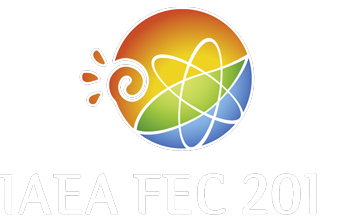Speaker
Mr
Alexey Razdobarin
(Ioffe Institute)
Description
According to recent experiments in plasma fusion machines, the contamination of optical elements under deposition-dominated conditions in ITER will result in fast degradation of their optical characteristics. The development of deposition-mitigation techniques is an important part of R&D program of ITER optical diagnostics. The presentation is focused on the approaches to be used for the protection/cleaning of first optical elements of the Divertor Thomson scattering (DTS) diagnostics involving combination of impurity fluxes mitigation technique and surface recovery based on plasma cleaning and laser ablation.
Acoustic compression waves induced by transient plasma phenomena such as ELMs are assumed to be the main mechanism of impurity transport in the remote areas of diagnostic ducts. The design of DTS laser launcher duct intended to mitigate the impurity fluxes is suggested. The numerical simulation was verified experimentally in the QSPA-T plasma gun facility.
Transparent optics is considered as the most vulnerable elements in ITER diagnostic assemblies since even thin metal deposits may significantly reduce optical transmission. Laser ablation, being one of the robust ways for remote recovery of diagnostic windows, is to be used for cleaning the first window of the DTS laser launcher. The long-term cleaning efficiency under continuous deposition of Al and W was studied for fused silica and alumina windows. The implementation of the laser cleaning technique for DTS diagnostics in ITER is discussed.
Another cleaning technique promising for diagnostic mirror protection is plasma cleaning. It was found to be efficient for removal of metal and metal oxide deposits. The implementation of plasma cleaning based on capacitively coupled (CC) RF discharge is discussed with the focus on the ITER-specific requirements to the system.
The parameters of CC RF discharge driven at 81.36 MHz and cleaning efficiency were studied for the following typical cases: metal mirrors and dielectric windows; cleaning with and without magnetic field; water-cooled mirrors.
| Country or International Organization | Russian Federation |
|---|---|
| Paper Number | MPT/P5-40 |
Author
Mr
Alexey Razdobarin
(Ioffe Institute)
Co-authors
Dr
Alexander Bazhenov
(Ioffe Institute)
Mr
Alexander Chernakov
(Ioffe Institute)
Dr
Alexander Gorodetsky
(Frumkin Institute of Physical Chemistry and Electrochemistry Russian Academy of Sciences)
Mr
Alexander Koval
(Ioffe Institute)
Dr
Alla Sitnikova
(Ioffe Institute)
Dr
Andrey Markin
(Frumkin Institute of Physical Chemistry and Electrochemistry Russian Academy of Sciences)
Dr
Andrey Zakharov
(Frumkin Institute of Physical Chemistry and Electrochemistry Russian Academy of Sciences)
Dr
Anna Yaroshevskaya
(SRC RF TRINITI)
Dr
Anton Putrik
(SRC RF TRINITI)
Mr
Artem Dmitriev
(Ioffe Institute)
Dr
Christian Vorpahl
(ITER Organization)
Dr
Demid Kirilenko
(Ioffe Institute)
Dr
Dmitrii Samsonov
(Ioffe Institute)
Dr
Eugene Mukhin
(Ioffe Institute)
Dr
Frank Leipold
(ITER Organization)
Dr
Gleb Kurskiev
(Ioffe Institute)
Mr
Ivan Bukreev
(Ioffe Institute)
Mr
Nikita Babinov
(Ioffe Institute)
Dr
Nikolay Klimov
(SRC RF TRINITI)
Mr
Pavel Chernakov
(Spectral-Tech, ZAO)
Dr
Rinad Zalavutdinov
(rumkin Institute of Physical Chemistry and Electrochemistry Russian Academy of Sciences)
Dr
Roger Reichle
(ITER Organization)
Mr
Sergey Masyukevich
(Ioffe Institute)
Dr
Sergey Tolstyakov
(Ioffe Institute)
Dr
Valentin Bukhovets
(Frumkin Institute of Physical Chemistry and Electrochemistry Russian Academy of Sciences)
Dr
Vladimir Semenov
(Ioffe Institute)
Mr
Vladimir Solokha
(Ioffe Institute)

